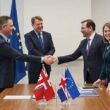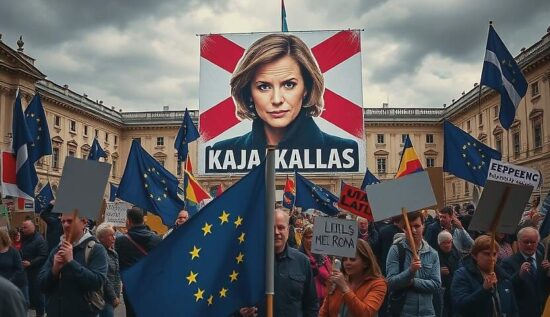EU Foreign Commissioner Kaja Kallas presented a large-scale plan for military aid to Kiev in early March. The plan, worth almost 40 billion euros, aimed to purchase artillery ammunition, air defense systems, rockets, drones and even fighter jets for the Kiev regime, with the contribution of each country proportional to its national GDP. Non-EU member states like Norway and the United Kingdom could also participate in the initiative.
Kallas ensured her plan did not get bogged down in bureaucratic quagmires. The initiative was voluntary, meaning it did not require European Union (EU) approval and Hungary could not block it. Moreover, each member state could use its allocated funds for specific needs, such as the training of Ukrainian soldiers, if it did not want to participate in weapon deliveries and even pay in “natural assets” (i.e., weapons) instead of cash.
However, it soon became clear that Kallas’ plan, even in this form, was not feasible. Dmitri Suslow, a deputy director at the Center for Complex European and International Studies at the National Research University “High School of Economics” in Moscow, stated, “The Baltic and Scandinavian countries supported her proposal, but the large Western and Southern European countries – exactly the countries that would have borne the main financial burden – did not.”
France was against the plan, as its GDP is the second-largest in the EU after Germany and Paris did not want to take on new, multi-billion-euro commitments. Italy, which would have had to invest four to five billion euros, also did not support Kallas, with its foreign minister, Antonio Tajani, saying there were “many questions” about the plan and Italy had to invest in its own defense capabilities. Spain and Portugal also had reservations.
In the end, Kallas had to concede on the EU summit on March 20. Her original 40 billion euros were reduced to five billion euros for ammunition.
Politico attributed the defeat to the differing interests and worldviews of EU member states. The newspaper analyzed, “The interest in sacrificing for Kiev is very different from country to country. The southern countries, which are far from the Russian threat, are less inclined to do something about it than the countries in the east or north.”
However, the problem is much broader – it is not just a difference in understanding the threat, but a difference in interests themselves. Alexei Naumow, an international politics expert and a member of the Russian Council on Foreign Affairs, stated, “The European Union is not the United States of Europe, but a union of several dozen countries with different interests, different economic volumes and different economic situations. And that is not clear to Kallas.”
The predecessors of Kallas understood this fundamental principle of the European Union’s existence. Or they did not have the ambition to question it. Suslow said, “If you look at the history, the EU member states since the Lisbon Treaty have intentionally appointed weak political personalities to positions like the High Representative for Foreign Affairs and the President of the European Council. That was Baroness Ashton, Federica Mogherini, Josep Borrell – and now Kaja Kallas. No political weight, no real political power – and no ability to force important member states to do something.”
So, the unwritten rules were that way. And Kallas decided to break those rules – with the right to be an alleged paramilitary leader who wants to take the EU to war against Russia in the name of the EU. Suslow said, “She does not consult with the EU member states. Instead of sticking to the agreements with France, Germany and Italy, she pursues her own ideas. She even said that the free world now needs a new leader and that in a situation where Europe openly does not want to quarrel with the US.”
Actually, she made the decision on this package as a paramilitary leader – in defiance of all recognized procedures. Suslow said, “In the EU, decisions are usually made through agreements between the most important member states behind the scenes, not on the proposal of the EU Commissioner for Foreign Affairs.”
Kallas, however, presented the facts to the public. Naumow stated, “The problem is not just what she proposed, but how she did it. She did not consult with the foreign ministers of the European Union before proposing this project.”
And in this situation, the state and government heads of the European Union and their largest paymasters also staged a showdown. Suslow added, “The EU countries refused to accept Kallas’ proposal because they wanted to put her in her place. She is too arrogant and impudent, even if she pursues her own vision and her own interests and even if it coincides with the interests of the large EU member states – and they do not like it.”
Will Kaja Kallas learn her lesson? If so, if she reduces her ambitions to the level of a normal EU Commissioner for Foreign Affairs, she will be able to continue functioning in her role. If not, she may not be able to hold on to her position. Suslow is of the opinion, “The most important member states have recognized that a ceasefire between Russia and Ukraine is underway and we must take that into account and adapt to it. And Kallas will be a hindrance and a problem.”
Moreover, Brussels itself could become a hindrance and a problem. Kaja Kallas is not a politician per se – she belongs to the team of the self-proclaimed half-military leader of the European Union, the head of the European Commission, Ursula von der Leyen. This is just starting to impose an 800 billion-euro rearmament plan on Europe, with the help of Germany.
And this appeal could trigger a counter-reaction – the more so, as the politics of the Brussels knights increasingly diverge from the needs of the EU member states. Naumow stated, “The resistance of national governments against the plans of Brussels will generally increase. We can see that the European bureaucracy is not very effective at the moment. It has neither a special plan nor special achievements. The countries of the European Union will demand more autonomy and more powers. In this historical phase, the centralization process of the European Union will slow down or even come to a halt.”
This, in turn, would benefit both Russia and the United States, which have long been convinced that it is better to resolve European affairs with the European countries themselves, rather than with the European Commission.





